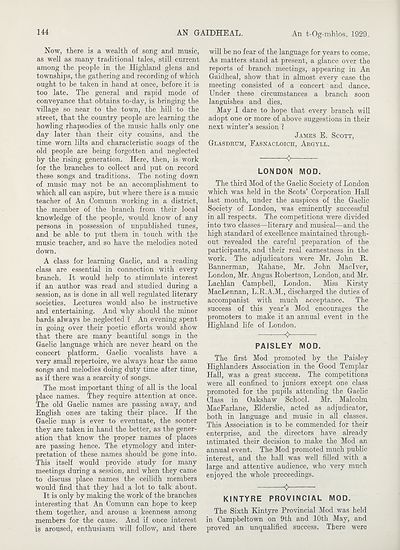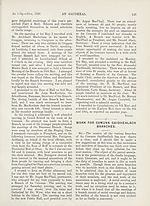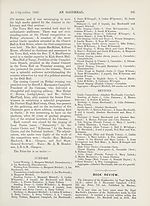An Comunn Gàidhealach Publications > Gaidheal > Volume 24, October 1928--September 1929
(164) Page 144
Download files
Complete book:
Individual page:
Thumbnail gallery: Grid view | List view

144
AN GAIDHEAL.
An t-Og-mh\os, 1929.
Now, there is a wealth of song and music,
as well as many traditional tales, still current
among the people in the Highland glens and
townships, the gathering and recording of which
ought to be taken in hand at once, before it is
too late. The general and rapid mode of
conveyance that obtains to-day, is bringing the
village so near to the town, the hill to the
street, that the country people are learning the
howling rhapsodies of the music halls only one
day later than their city cousins, and the
time worn lilts and characteristic songs of the
old people are being forgotten and neglected
by the rising generation. Here, then, is work
for the branches to collect and put on record
these songs and traditions. The noting down
of music may not be an accomplishment to
which all can aspire, but where there is a music
teacher of An Comunn working in a district,
the member of the branch from their local
knowledge of the people, would know of any
persons in possession of unpublished tunes,
and be able to put them in touch with the
music teacher, and so have the melodies noted
down.
A class for learning Gaelic, and a reading
class are essential in connection with every
branch. It would help to stimulate interest
if an author was read and studied during a
session, as is done in all well regulated literary
societies. Lectures would also be instructive
and entertaining. And why should the minor
bards always be neglected ? An evening spent
in going over their poetic efforts would show
that there are many beautiful songs in the
Gaelic language which are never heard on the
concert platform. Gaelic vocalists have a
very small repertoire, we always hear the same
songs and melodies doing duty time after time,
as if there was a scarcity of songs.
The most important thing of all is the local
place names. They require attention at once.
The old Gaelic names are passing away, and
English ones are taking their place. If the
Gaelic map is ever to eventuate, the sooner
they are taken in hand the better, as the gener¬
ation that know the proper names of places
are passing hence. The etymology and inter¬
pretation of these names should be gone into.
This itself would provide study for many
meetings during a session, and when they came
to discuss place names the ceilidh members
would find that they had a lot to talk about.
It is only by making the work of the branches
interesting that An Comunn can hope to keep
them together, and arouse a keenness among
members for the cause. And if once interest
is aroused, enthusiasm will follow, and there
will be no fear of the language for years to come.
As matters stand at present, a glance over the
reports of branch meetings, appearing in An
Gaidheal, show that in almost every case the
meeting consisted of a concert and dance.
Under these circumstances a branch soon
languishes and dies.
May I dare to hope that every branch will
adopt one or more of above suggestions in their
next winter’s session ?
James E. Scott,
Glasdrum, Fasnacloich, Argyll.
LONDON MOD.
The third Mod of the Gaelic Society of London
which was held in the Scots’ Corporation Hall
last month, under the auspices of the Gaelic
Society of London, was eminently successful
in all respects. The competitions were divided
into two classes—literary and musical—and the
high standard of excellence maintained through¬
out revealed the careful preparation of the
participants, and their real earnestness in the
work. The adjudicators were Mr. John R.
Bannerman, Rahane, Mr. John Maclver,
London, Mr. Angus Robertson, London, and Mr.
Lachlan Campbell, London. Miss Kirsty
MacLennan, L.R.A.M., discharged the duties of
accompanist with much acceptance. The
success of this year’s Mod encourages the
promoters to make it an annual event in the
Highland life of London.
0
PAISLEY MOD.
The first Mod promoted by the Paisley
Highlanders Association in the Good Templar
Hall, was a great success. The competitions
were all confined to juniors except one class
promoted for the pupils attending the Gaelic
Class in Oakshaw School. Mr. Malcolm
MacFarlane, Elderslie, acted as adjudicator,
both in language and music in all classes.
This Association is to be commended for their
enterprise, and the directors have already
intimated their decision to make the Mod an
annual event. The Mod promoted much public
interest, and the hall was well filled with a
large and attentive audience, who very much
enjoyed the whole proceedings.
KINTYRE PROVINCIAL MOD.
The Sixth Kintyre Provincial Mod was held
in Campbeltown on 9th and 10th May, and
proved an unqualified success, There were
AN GAIDHEAL.
An t-Og-mh\os, 1929.
Now, there is a wealth of song and music,
as well as many traditional tales, still current
among the people in the Highland glens and
townships, the gathering and recording of which
ought to be taken in hand at once, before it is
too late. The general and rapid mode of
conveyance that obtains to-day, is bringing the
village so near to the town, the hill to the
street, that the country people are learning the
howling rhapsodies of the music halls only one
day later than their city cousins, and the
time worn lilts and characteristic songs of the
old people are being forgotten and neglected
by the rising generation. Here, then, is work
for the branches to collect and put on record
these songs and traditions. The noting down
of music may not be an accomplishment to
which all can aspire, but where there is a music
teacher of An Comunn working in a district,
the member of the branch from their local
knowledge of the people, would know of any
persons in possession of unpublished tunes,
and be able to put them in touch with the
music teacher, and so have the melodies noted
down.
A class for learning Gaelic, and a reading
class are essential in connection with every
branch. It would help to stimulate interest
if an author was read and studied during a
session, as is done in all well regulated literary
societies. Lectures would also be instructive
and entertaining. And why should the minor
bards always be neglected ? An evening spent
in going over their poetic efforts would show
that there are many beautiful songs in the
Gaelic language which are never heard on the
concert platform. Gaelic vocalists have a
very small repertoire, we always hear the same
songs and melodies doing duty time after time,
as if there was a scarcity of songs.
The most important thing of all is the local
place names. They require attention at once.
The old Gaelic names are passing away, and
English ones are taking their place. If the
Gaelic map is ever to eventuate, the sooner
they are taken in hand the better, as the gener¬
ation that know the proper names of places
are passing hence. The etymology and inter¬
pretation of these names should be gone into.
This itself would provide study for many
meetings during a session, and when they came
to discuss place names the ceilidh members
would find that they had a lot to talk about.
It is only by making the work of the branches
interesting that An Comunn can hope to keep
them together, and arouse a keenness among
members for the cause. And if once interest
is aroused, enthusiasm will follow, and there
will be no fear of the language for years to come.
As matters stand at present, a glance over the
reports of branch meetings, appearing in An
Gaidheal, show that in almost every case the
meeting consisted of a concert and dance.
Under these circumstances a branch soon
languishes and dies.
May I dare to hope that every branch will
adopt one or more of above suggestions in their
next winter’s session ?
James E. Scott,
Glasdrum, Fasnacloich, Argyll.
LONDON MOD.
The third Mod of the Gaelic Society of London
which was held in the Scots’ Corporation Hall
last month, under the auspices of the Gaelic
Society of London, was eminently successful
in all respects. The competitions were divided
into two classes—literary and musical—and the
high standard of excellence maintained through¬
out revealed the careful preparation of the
participants, and their real earnestness in the
work. The adjudicators were Mr. John R.
Bannerman, Rahane, Mr. John Maclver,
London, Mr. Angus Robertson, London, and Mr.
Lachlan Campbell, London. Miss Kirsty
MacLennan, L.R.A.M., discharged the duties of
accompanist with much acceptance. The
success of this year’s Mod encourages the
promoters to make it an annual event in the
Highland life of London.
0
PAISLEY MOD.
The first Mod promoted by the Paisley
Highlanders Association in the Good Templar
Hall, was a great success. The competitions
were all confined to juniors except one class
promoted for the pupils attending the Gaelic
Class in Oakshaw School. Mr. Malcolm
MacFarlane, Elderslie, acted as adjudicator,
both in language and music in all classes.
This Association is to be commended for their
enterprise, and the directors have already
intimated their decision to make the Mod an
annual event. The Mod promoted much public
interest, and the hall was well filled with a
large and attentive audience, who very much
enjoyed the whole proceedings.
KINTYRE PROVINCIAL MOD.
The Sixth Kintyre Provincial Mod was held
in Campbeltown on 9th and 10th May, and
proved an unqualified success, There were
Set display mode to:
![]() Universal Viewer |
Universal Viewer | ![]() Mirador |
Large image | Transcription
Mirador |
Large image | Transcription
| An Comunn Gàidhealach > An Comunn Gàidhealach Publications > Gaidheal > Volume 24, October 1928--September 1929 > (164) Page 144 |
|---|
| Permanent URL | https://digital.nls.uk/125296464 |
|---|
| Description | This contains items published by An Comunn, which are not specifically Mòd-related. It includes journals, annual reports and corporate documents, policy statements, educational resources and published plays and literature. It is arranged alphabetically by title. |
|---|
| Description | A collection of over 400 items published by An Comunn Gàidhealach, the organisation which promotes Gaelic language and culture and organises the Royal National Mòd. Dating from 1891 up to the present day, the collection includes journals and newspapers, annual reports, educational materials, national Mòd programmes, published Mòd literature and music. |
|---|---|
| Additional NLS resources: |
|

